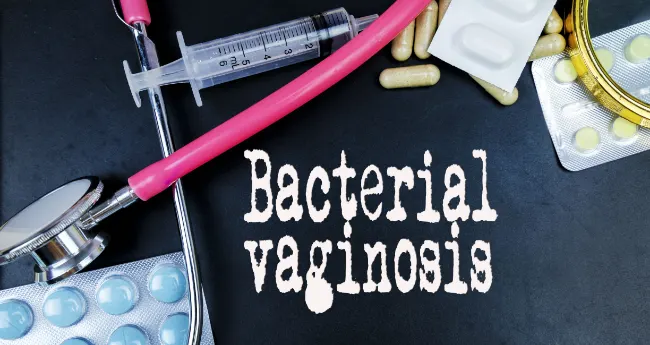Vaginal Infection During Pregnancy: Types and Causes

Pregnancy comes with a truckload of changes – from physical to emotional. And for those who are pregnant for the first time, every little change such as unusual discharge when pregnant brings with it a wave of confusion and uncertainty. So, it’s natural to feel concerned when you experience any vaginal itch during pregnancy. This could be a symptom of vaginal infection during pregnancy.
Types of vaginal infections during pregnancy
There are many types of vaginal infections that you could get during pregnancy, with bacterial vaginosis and yeast infection being the common ones. Let’s look at the different types of vaginal infections during pregnancy:

1. Bacterial Vaginosis
If you’ve got severe vaginal itching during pregnancy and you have no idea what could have triggered it, you most likely have bacterial vaginosis. This vaginal infection is common during pregnancy and is the result of overgrowth of bacteria, that is naturally present, in the vagina. The shifting hormone levels could cause this overgrowth. Bacterial vaginosis during pregnancy is characterised by symptoms such as:
- Severe and irritating itching around the vagina
- Discharge that is thin in consistency, and grey or white in colour
- Foul-smelling discharge
- Painful urination.
Sometimes, the infection goes away by itself. However, in most cases, a course of antibiotics is recommended for treatment. If you have bacterial vaginosis while pregnant, it is recommended that you consult your doctor who can prescribe the best treatment plan.
2. Yeast Infection
Experiencing vaginal itching during pregnancy could be a result of yeast infection, another common vaginal infection during pregnancy. Its most noticeable symptom is burning and itching in the vagina. The reason why pregnant women are more likely to get this infection is due to increased levels of oestrogen and progesterone, which make a conducive environment for yeast to grow and thrive. Some of the other signs include:
- Pain in the vagina
- Whiteish-yellow vaginal discharge with the consistency of thick, curdled milk
- Swelling of the vagina accompanied by redness
- Discomfort during intercourse.
The treatment includes either oral antifungal medicine or a cream. Speak to your doctor if you suspect you have any of the above symptoms.
3. Group B Strep (GBS)
A type of bacteria, Group B Strep is naturally found in most people. However, some people develop more serious infections from it while others go unscathed. The reason for this is unclear which makes it difficult to diagnose. However, if you do have these bacteria, it is imperative that you get appropriate treatment as it could be life-threatening to your baby, if passed on to them during childbirth. The signs of this vaginal infection, common during pregnancy, are very rare. Here is one:
- Urinary tract infections due to GBS cause painful urination and cloudy urine.
4. Syphilis
An STI, syphilis results in sores typically found on the external genitals i.e. in the vagina, anus or rectum. It can also be present on a person’s lips and in the mouth. If you have this vaginal infection while you’re pregnant, you must seek medical help immediately as you can pass the infection to your baby. Some of the common symptoms include:
- Small, hard, painless sores in the genital or vaginal area
- Sores and rashes on the palms of your hands and on the bottoms of your feet accompanied with fever, sore throat, headaches, weight loss and fatigue among others.
If you have any of the above symptoms, contact your doctor immediately. Getting early treatment for syphilis in pregnancy will help protect you and your baby.
5. Trichomoniasis
A sexually transmitted infection (STI), trichomoniasis can also cause vaginal itching during pregnancy but this condition can be easily cured. Its treatment includes a course of oral antibiotics. Some of its symptoms include:
- Having itching and burning sensation while having intercourse
- Green discharge or yellowish discharge
- Discharge that smells foul.

If you’re looking at something that makes it easier to manage vaginal discharge, panty liners are a convenient option. Try the ALWAYS Extra Protect Panty liners to keep you dry and comfortable. They are formulated with an absorbing zone and odour neutralising technology. Offering extra coverage, these liners are reliable, absorb discharge fast and keep you fresh, making ALWAYS liners perfect for protection from vaginal discharge.
Why pregnant women are more susceptible to vaginal infections
Infections and vaginal itch are common during pregnancy. But little did you know that pregnancy can also make these infections more severe. At times, even the mildest infections can lead to serious illness in pregnant women. But what is it that makes women susceptible to vaginal infections during pregnancy?
Changes in hormone levels and immune system function are the primary reasons why you become more vulnerable to infections when you’re pregnant. Let’s look at both causes in detail.
1. Changes in immunity
Your immune system is like a fortress that protects your body from every harmful thing – right from bacteria and cancer cells to transplanted organs. However, when you’re pregnant, your immune system changes to protect both you and your baby. There is a delicate balance at play wherein some parts of your immune system are enhanced while others are suppressed. This immunity balance is what prevents any infections from reaching the baby without compromising the health of the mother.
This means that your immune system has to work twice as hard during pregnancy since it’s supporting and protecting you and your baby. This strain can make you susceptible to certain infections.
2. Changes in hormones
Changes in hormonal levels can also increase your risk of getting infected. Often, these fluctuations in hormone levels affect the urinary tract.
As your pregnancy progresses and the uterus expands, there is increased pressure on the bladder. Alongside, the increased production of progesterone relaxes the ureter and bladder muscles. This results in urine remaining in the bladder for too long, which could lead to urinary tract infection.
Similarly, the body also increases the production of another hormone called oestrogen. This makes you more likely to get yeast infection.

How to prevent vaginal infections during pregnancy?
You can help keep vaginal infections at bay during pregnancy with simple, everyday precautions. Maintaining intimate hygiene can help in the long run by protecting both you and your baby. Here are some tips :
- Make sure to wash your hands with soap and water often, especially after using the bathroom, cooking, or touching raw meat and vegetables, and playing with children.
- When cooking any meat, make sure that it is cooked through and well-done. Do not eat undercooked meats such as hot dogs and deli meats. If you do, make sure that they are re-cooked.
- Avoid consuming unpasteurised, or raw, dairy products.
- Avoid sharing your utensils, cups, and food with other people.
- Avoid changing cat litter and stay away from wild or pet rodents.
- To reduce the risk of yeast infections, you can eat yogurt often since it is rich in probiotics.
- To prevent bacterial vaginosis, avoid douching. It removes some of the bacteria that actually protects your vagina from infection.
- Stay well hydrated, and sleep without underwear for better air flow and breathability.
- Ensure your vaccination schedule is up to date.
- In case you suspect you have any kind of infection or disease, immediately consult your doctor. It is better to get an infection diagnosed and treated earlier to avoid risking your health as well as your baby’s.
Takeaway
It is normal and okay to have vaginal infections during pregnancy. So, if you suspect any of its symptoms, don’t be alarmed. It is important to stay calm and stress free. Speak to your doctor and get the correct treatment. Meanwhile, take preventive measures to avoid the risk of getting infected.
Stay well prepared for your next period by tracking it on Always Period Calculator
If you're wondering how to reduce vaginal wetness, our guide provides practical tips to help you manage it effectively.
Disclaimer:
Please note the date of last review or update on all articles. No content on this site, regardless of date, should ever be used as a substitute for direct medical advice, diagnosis or treatment from your doctor or other qualified clinician. Always is committed to ensuring that all of our products meet rigorous safety standards; Always pads prioritize safety, protection and comfort of its consumers.




